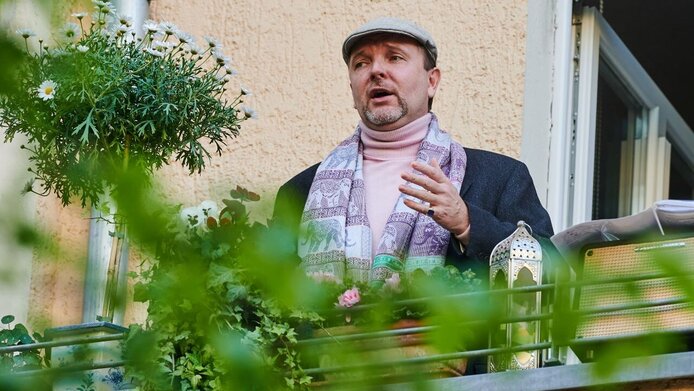Choirs and coronavirus – the political dimension of singing

Antonia Egel is a literary scholar and a passionate choir singer. The amateur members of the Freiburg Bach Choir, in which Egel has been singing (with interruptions) for many years, used to meet regularly for rehearsals. – All of a sudden the pandemic broke out, strict curfew rules were imposed and singing together was out of the question. Like so many others in the world, the choir quickly reorganised itself and shifted rehearsals into virtual space. In the spring of 2020, the Freiburg singers joined forces with their Israeli partner choir as a sign of solidarity, and released Shalom aleichem on YouTube.
Music connects people, bringing them joy, but also courage. Music provides comfort to the soul in difficult times, as demonstrated by the joint project of the Freiburg Bach Choir and the Ma’ayan Choir from Tel Aviv. Researchers maintain that music even has the effect of an antidepressant. This might also explain why it has not only survived the corona crisis, but has contributed essentially to strengthening the bond between people. Virtual performances and spontaneous concerts out of windows gave us hope and strength when the pandemic broke out. Today, one year later, they have already become an iconic image of the Covid19 pandemic.
The individual versus society
Antonia Egel says that for her the partner project with the choir from Israel was “a real ray of sunshine”. “It showed me that the choir can provide bridges that other media may have more difficulty providing.” And most of all, it is proof of Egel’s research hypothesis, which focuses on the political aspects of the chorus in 20th century drama. “The choir reveals the political aspects – on stage as well as in our daily lives,” Antonia Egel notes. Indeed, a choir needs each individual voice to be as well trained as possible and sing as independently as possible in order to come together and produce the collective sound of the choir, which goes well beyond the individual voice. How much of a “we” can we be without losing ourselves completely, and how much of an “I” do I have to remain in order to be able to join in the “we” and still remain an independent agent? These questions have been negotiated in choirs since antiquity. For Aristotle, the choir was a model for the state.
Referencing back to musical tradition as a communal element
In the political fabric of the dramatic 20th century, the tensions grew between the two extremes of individuality and the collective. In totalitarian systems, the choir was also instrumentalised and became a political sphere on the theatrical stage. The productions of Bertolt Brecht were a prime case in point. “Several decades later, the author Elfriede Jelinek was one of those who picked up on this aspect and reinterpreted it in a contemporary way,” explains Egel, whose research project was funded by the Austrian Science Fund FWF. “Similar to Brecht, with Jelinek it boils down to a collective being shown, and the individual either goes under in the process or no longer counts as an individual.” Egel’s textual analyses show that the situation is different in the case of Peter Handke, a contemporary of Jelinek.
In Handke’s work, the individual is important and is upheld in the context of the many. “In my research project, I critically explored whether the members of a group always speak with one voice and saw that it didn’t necessarily have to be this way. I found an example of that in the work of Einar Schleef, who was much criticised for the collective appearance of his choirs. While this is indeed part of his work, he also addresses the relationship between the individual and the chorus.” In this context, Egel makes reference to Bach’s Passions. She finds that Schleef and many other directors and authors took up the ancient tradition and used this musical form as a basis for their concepts. Jelinek also made reference to Brahms’ Requiem, for instance. “20th century theatre has a close connection to musical tradition, which was a surprising result for me,” Egel notes.
The choir as a model for modern society
When speaking of modern-day democracies, can the choir also serve as a model for an open and pluralistic society? Antonia Egel is convinced that it can. In a democratic society, the individual bears responsibility both for him- or herself and for the community. “This is a highly complicated political thing that we basically have to renegotiate every day.” The question of who dominates the public sphere always comes up in this context.
Beethoven’s famous 9th Symphony and the final chorus with the “Ode to Joy” have a special role to play here. As the official anthem of the European Union, the Ode to Joy stands for humanism, enlightenment and international understanding. Against this backdrop, Beethoven flash mobs have become popular on the internet since 2012. In 2016, when the association Pulse of Europe raised its voice against the rise of nationalism in the EU for the first time, there was a direct connection to (European) politics. The Pulse of Europe events have become famous and an important forum for citizens who engage with politics –, anyone and everyone is welcome to join in. Many of the events end with Beethoven’s Ode to Joy.
Personal details
Antonia Egel studied German and history in Freiburg im Breisgau, where she received her doctorate for her thesis on the musical poetics of Rilke. Research stays took her to Japan, Italy and the USA. Egel conducted the interdisciplinary research project “On the Chorus in 20th Century Drama” (2018-2019) at the University of Salzburg. It was funded by a Lise Meitner Fellowship from the Austrian Science Fund FWF. Egel’s professorial thesis will soon be published by Rombach Verlag.
Publications
Antonia Egel: ‘Pulse of Europe’ – Flash Mob – Symphony. Schiller’s ‘Ode to Joy’ and Beethoven’s ‘Ninth Symphony’ as Soundtrack at Public ‘Stagings’ of Europe, in: Forum Modernes Theater, Bd. 31, 2020
Antonia Egel: Politik im Lied. Chorische Inszenierung und politisches Handeln am Beispiel der EU, Beethovens und Brechts, in: Günter Figal, Bernhard Zimmermann (Hg.): Internationales Jahrbuch für Hermeneutik – Schwerpunkt: Pluralität, Bd. 19, Mohr Siebeck 2020
Antonia Egel: „chor oh“. Bernhard und Jelinek – Sprechen im Chor?, in: Elfriede Jelinek und Thomas Bernhard, hg.v. Bastian Reinert und Clemens Götze, De Gruyter 2019





